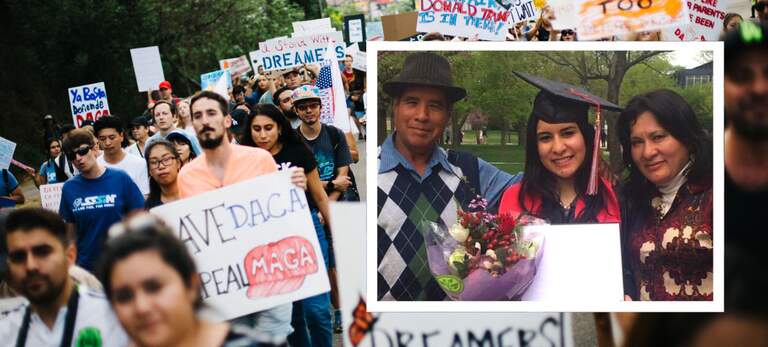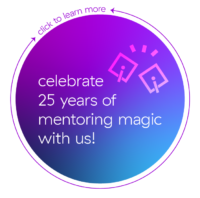Joselin Cisneros is an education fellow at The Kresge Foundation, where she supports the Education Program’s effort to help students of color and those with low incomes to attain a post-secondary education. We spoke with Cisneros about the current higher ed landscape for undocumented students, about the power of mentoring, and about how her experience as an immigrant informs her work at Kresge.
Previously, Cisneros served as a research associate at the National Forum on Higher Education for the Public Good, where she was involved in the development of a comprehensive study of the opportunities and challenges faced by undocumented students seeking to enroll in Michigan public higher education institutions. She also worked at Enlace Chicago as a post-secondary coordinator, supporting first-generation students of color to attend college.
A native of Chicago, Cisneros earned a Bachelor of Science in sociology from the Illinois Institute of Technology and a master’s degree in higher education from the University of Michigan.
What was your path to the Kresge Foundation?
I was not thinking about philanthropy. I happened to stumble upon the opportunity after I became a college advisor and then went to grad school at University of Michigan. As a college advisor, I was beginning to feel frustrated at the systems that students encountered, and I was propelled to seek my master’s in higher education.
My passion was to work with students and provide knowledge and guidance for those facing some of the same challenges I had when I was seeking my bachelor’s degree. Because of my undocumented status, I went to three different institutions. It was a very difficult endeavor. I tell my students I had the full college experience: I went to a public, a private, and a community college.
Some obstacles I couldn’t remove for our undocumented students. For example, some students didn’t qualify for DACA (Deferred Action for Childhood Arrivals) only because they arrived a few weeks late and consequently did not meet the program requirements. And for my other students who did have documents but were first-generation and students of color, verification forms werea significant burden. All my non-undocumented students were constantly selected for verification for FAFSA (Free Application for Federal Student Aid). I remember one student saying, “Do they not want me going to college?” When students submit the FAFSA, if something doesn’t check out, or if they have parents who are undocumented, they would get selected for verification—meaning they had to provide more information to the institution. At the time, verification was lengthy, so in addition to completing the long FAFSA form, they had to complete more forms for every institution.
Our systems put up a lot of walls for students to jump through. I realized I needed to either work at an institution where I can help remove these barriers or provide some knowledge of what’s happening on the other side.
Do undocumented students continue to benefit from DACA policy?
A lot of DACA eligibility requirements are not catching up with where we are now. One requirement is that you must have arrived in the US by a certain date in 2012, so a lot of the students now graduating high school don’t qualify for that version of DACA.
Biden’s administration proposed a new version of DACA where they slightly changed the requirements to include more students. But that iteration was challenged in court and didn’t go through. Today there are no new DACAs, and even students who do qualify for the original version of DACA are not able to apply as a first-time recipient. The issue is likely to go to the Supreme Court, and the likelihood of DACA going away is very high.
Even though DACA doesn’t provide a pathway to citizenship, it gives you the ability to work, and that in itself makes a huge difference. It allows you to get a state ID, a driver’s license. It would be devastating to not have DACA at all. But because DACA isn’t a law, at any point it can be taken away. We need formal legislation.
What does this mean for undocumented students in the meantime?
Undocumented students have the same challenges they faced before DACA existed – not being able to access scholarship or state aid, depending on the state you live in. For example, if you live in Georgia and are undocumented, the state doesn’t allow you to enroll in any top institutions. So whether you can go to college depends on where you live. The institutions could say “We’re only providing support if you do have DACA.” Unfortunately, only a quarter of undocumented students graduating from high school are eligible for DACA. These policies are outdated for many of these students.
You may be disillusioned and unmotivated, because you might go to college but not be able to work. For many students, they don’t see the point of going to college when there’s no end goal, when there’s no way to say “At least I’ll be able to work.” So you might see students not go to college at all.
Do colleges support undocumented students?
When I was applying for college, the undocumented student issue wasn’t acknowledged. Students were scared to say anything because we ran the risk of getting deported or putting our families at risk. But then undocumented students started speaking up because they were tired of being pushed out. They started organizing in their communities and their campuses. This is the reason why now we have DACA and why more colleges changing their policies and are aware of the challenges undocumented students are facing.
We also see more scholarships and programs that are now opened to undocumented students. When I was a senior in high school in Chicago, programs like POSSE and Chicago Scholars weren’t open to undocumented students. Today, both those programs are open. Other new nonprofits have been created to specifically support undocumented students, like TheDREAM.US, which provides scholarships, and the Presidents’ Alliance for Higher Education and Immigration, which advocates for policies and legislation at the state and federal level that support undocumented students. They are trying to figure out how to best support undocumented students. This signals to students that there are some doors open, which is a big difference.
But unfortunately, when it comes to college and how safe you feel it all depends on where you live. For example, in Chicago, Illinois, we just passed legislation that allows undocumented students to access state merit aid, which makes a big difference—$6,000 to $7,000. But Michigan does not have any legislation whatsoever, so every institution has their own policy but don’t always put that on their website. Students have to navigate the applications blindly because they don’t ‘know what the policies are.
The process of applying for college is daunting as is. But when you have these other layers for undocumented students—trying to figure out what institutions to apply to, what institutions offer funding—a lot of students opt for community college. Community colleges are a great option but we know that they need better funding to ensure that students have the resources that they need to graduate and transfer to a four-year college.
Students work so hard. I remember seeing students excited about big institutions, but once they saw the price and the reality, many opted to go to the closer public institution that wouldn’t charge as much.
Ultimately, the biggest challenges is that we don’t have a federal policy and students are not eligible to apply for federal aid.
What can having a mentor mean for first-generation college students?
First-generation college students are navigating a system that was not created for them. Theyare purposely being filtered out, and, as the first in their families to go to college, they are trying to figure out how not get pushed out of the system. Without the mentors in my life who supported and guided me, I would have been pushed out of the system and not be where I am today. I found mentors throughout my life who had experienced similar challenges, and hearing their stories helped me because I knew I was not alone. I had someone who I could reach out for advice, and if they didn’t know the answer, they had a network of people who they could reach out to and connect me with.
One of the most important pieces of advice I got from my mentors was how to advocate for myself. They shared with me how I can request more financial aid or told me that I could talk to professors to ask for additional time to submit an assignment because I might be struggling academically or personally. There are many unwritten rules and if you don’t know about them, it is very easy to give up. For that reason, the work that iMentor does is so crucial to ensuring that students don’t go through this difficult college journey alone. We live in a society where we must navigate the journey like a maze, and if you don’t have someone guiding you, you feel lost. Having a mentor for first-generation students can make the difference between going to college and not going, persisting a second year or dropping out, and graduating or giving up all together.
How does your experience as an immigrant affect how you approach your work as an education program fellow at Kresge Foundation?
Being a fellow in philanthropy has been a privilege and a huge responsibility for me to bring issues to the forefront that might not be top of mind for everybody. My experience is very intersectional. I grew up as a student of color, low income. How can I best support and bring more voices to the table that have been impacted by the issues we care about? I’m constantly trying to toggle with that—not just with undocumented student issues, but with racial equity. How can we work in partnership with the community and the organizations providing support on the ground?
At Kresge, we created an immigration learning group so we can become more aware. My experience is not the same story that every single immigrant has. It’s not just a Latino issue, even though the majority of immigrants are Latino. There are a lot of different immigrants and every single experience is different.
The next few years are going to be so critical. I know the difference that DACA has made on my life. But so many students right now don’t quality for DACA, and that needs to be top of mind for foundations and those in other sectors. What does that mean for this country? DACA is not legislation. It’s not a pathway to citizenship.
I’m thankful there are so many organizations out support undocumented students but at the end of the day, what we need is legislation and policies that are inclusive. Oftentimes, when legislation is being put together, it leaves some students out. We’re seeing that with DACA. If we care about the education of students, we would be removing these barriers. The barriers have been there for such a long time.
Even though this country prides itself on being the land of opportunity, that’s not the case for everyone. It’s the land of opportunity for whom? Instead, we’re saying, “No, not you. You can’t go to college. You can’t have this job.“ It’s complicated, living in this country. As foundations and institutions need to be doing a better job of collaborating to better support undocumented students, low-income students, and students of color.

